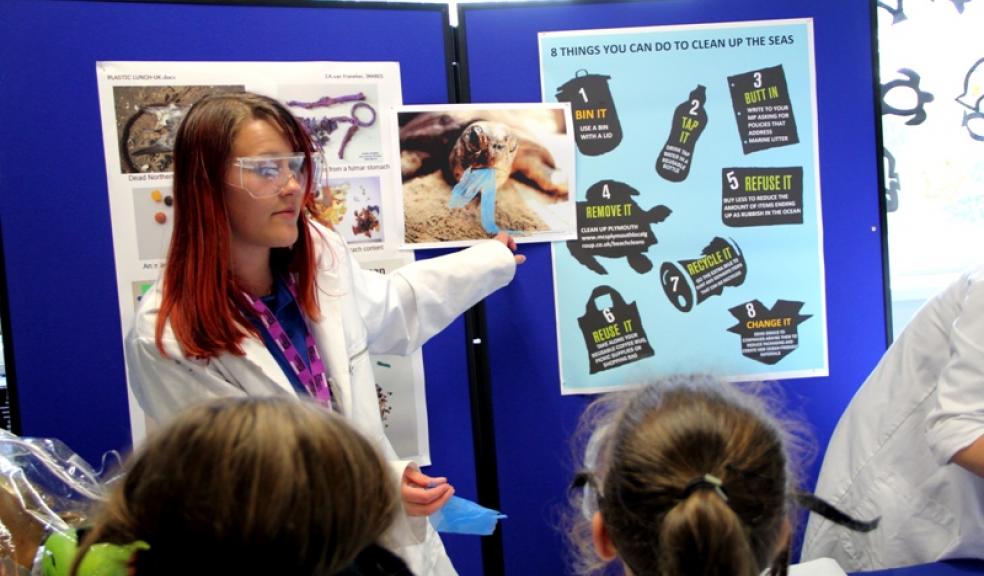
Survey shows that children's 'pester power' can help tackle the plague of ocean debris
An event which aimed to show children how marine plastics were damaging seas and wildlife, highlights the potential ‘pester power’ youngsters might have in encouraging change, according to researchers.
More than 150 children aged eight to 13 completed a short survey before and after participating in a range of activities at the Ecover Schools Blue Mile event in Plymouth, which sought to raise awareness of the problem of marine litter.
The survey by researchers from Plymouth University assessed what they had learnt and whether taking part had changed their perceptions about marine litter and reported behaviours.
Results show that youngsters' views changed as they learnt more about the topics of marine litter and came to understand the impacts and solutions. More specifically, children’s problem awareness increased as they showed more concern about the issue after taking part in the event.
Children also perceived greater negative impacts of marine litter, and their knowledge improved regarding the possible sources of the rubbish, the predominance of plastic, and the potential time it takes litter to degrade.
Crucially, the children reported that since the event in June, they are now encouraging family and friends to perform more litter-reducing behaviours, showing the importance of ‘pester power’.
Conrad Humphreys, organiser of the Ecover Schools Blue Mile, said: “These results are very interesting because they show that knowledge of the issue of ocean plastics does make a difference to this generation and that the children then use their ‘pester power’ to influence their families.
“The findings will certainly have a bearing on our schools programme going into next year and hopefully we can encourage more young people to influence their family’s lifestyle choices.”
The results of the survey coincide with a report which warns that the health of the world’s oceans is deteriorating even faster than had previously been feared. A review from the International Programme on the State of the Ocean (IPSO), says that conditions are ripe for the sort of mass extinction event that has afflicted the oceans in the past.
Among the activities the children took part in at the event was a shopping experiment to see if ‘traffic light’ labelling on packaging made any difference to their purchasing habits – and it did. This system would see a green dot for packaging that uses recycled material, can be recycled and uses the minimum amount of material; a red dot on packaging that does not use recycled content, is difficult to recycle and uses more material than it needs to; and an amber dot would be used for material in-between.
The idea is being advocated by international marine debris expert Professor Richard Thompson of Plymouth University, who believes that youngsters are the key to a reduction in the amount of plastics being used. Much of the plastic is only used once before being discarded and record amounts are ending up in the sea, with consequences for marine life.
Together with colleagues, Dr Sabine Pahl and Bonny Hartley from the university’s Psychology Department, Professor Thompson surveyed 154 children from 11 Plymouth schools. The youngsters completed a questionnaire about their attitudes before and after the three-day Ecover Schools Blue Mile at the city’s National Marine Aquarium.
Professor Thompson said the youngsters have a huge role to play – not just because they are the consumers of the future, but because they can influence their parents now.
Plastics account for a staggering 75% of all rubbish found in our seas – and some of it ends up killing wildlife. A recent report by Professor Thompson found that 663 species have to date been affected by marine debris – 80% of which was plastics. The number of species affected is rising all the time. Many of the creatures had suffered entanglement or ingestion and among the most badly hit were turtles, seals and whales.
Beau Le Bredonchel, Outreach Specialist at Plymouth University, said: “If these youngsters don’t understand what it happening to the seas then it will only get worse. This is the generation that will make the difference. Without change, we’ll have no fish or marine life in the seas.”

















